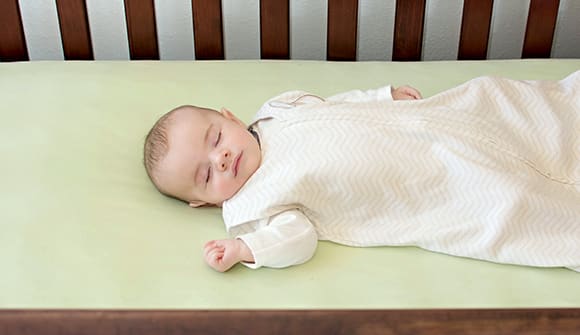When milestones aren't met
How to tell if your child needs speech, physical or occupational therapy.
Article Author: Beverly Wong-Ken
Article Date:

When your baby isn’t crawling or your child doesn’t seem to be picking up writing as easily as others, it’s normal to be concerned. A little Googling can lead you down a rabbit hole of confusing abbreviations: PT for this, OT for that, and what the heck are SLPs?
Specialists at Wolfson Children’s Rehabilitation explained what parents need to know about common milestones and potential interventions, ensuring you have the guidance and understanding you need to support your child’s development.
What are the differences between physical, occupational and speech-language therapies?
When you think about adults, occupational therapy (OT) usually has to do with completing tasks of daily life: learning to walk again after major surgery or how to safely put on shoes when age begins to affect your balance. But what about for children? How is OT different from physical therapy (PT) anyway?
“Occupational therapy helps children develop fine motor abilities, sensory processing skills, coordination, and the ability to do self-care tasks,” explained Cora Tardiff, MS, OTR/L, registered occupational therapist with Wolfson Children’s Rehabilitation. “Therapists work closely with children and their families to create personalized strategies that promote independence, confidence and participation at home, school and in the community.”
Physical therapy helps children develop strength, coordination, balance and mobility so they can confidently explore and navigate their daily world.
“Physical therapists work with children of all ages with developmental delays, injuries or conditions that affect movement and posture,” said Kelsey Leader, PT, DPT, a lead pediatric physical therapist. “We also help by checking how each child moves, suggesting the right equipment like braces or walkers, and making sure it fits and works well. This helps children stay safe, become more independent and take part in activities.”
Speech-language therapy supports a wide range of communication and feeding skills.
“Speech-language pathologists are experts in how the mouth and throat work, which makes them uniquely qualified to help with both speaking and eating,” explained Hannah Thompson, MS, CCC-SLP, lead clinical speech-language pathologist (SLP). “They can support verbal and nonverbal communication, assist infants with latching or transitioning after feeding tubes, and help children who struggle with chewing, swallowing or food texture sensitivities, even picky eating."
How will I know if my child needs rehabilitation services?
According to Leader, when babies and kids aren’t meeting the usual developmental milestones, it may be time for physical, occupational or speech-language therapy.
Signs your child may need physical therapy (PT) include:
- Not rolling over by 4 to 6 months.
- Not sitting up independently by 6 to 8 months.
- Not crawling by 9 to 12 months.
- Not walking by 12 to 18 months.
Occupational therapy (OT) might be helpful if your little one has:
- Difficulty with fine motor skills, like holding a pencil, buttoning clothes or using utensils.
- Challenges with sensory processing, such as being overly sensitive to sounds, textures or lights.
- Struggles with coordination and balance during everyday activities or play.
- Trouble with self-care tasks, including dressing, grooming or feeding.
Speech-language therapy may benefit your child if he or she:
- Has difficulty pronouncing sounds clearly.
- Struggles to understand or use language.
- Stutters or has trouble with speech fluency.
- Has a quiet, hoarse or nasal-sounding voice that affects communication.
- Struggles with following directions, answering questions or participating in conversations.
- Experiences challenges with social communication skills, such as taking turns or staying on topic.
- Has difficulty feeding or swallowing, such as trouble chewing, frequent coughing or choking during meals.
How can I get my child to see a therapist?
"To see a Wolfson Children’s Rehab therapist, you’ll need a referral from your child’s physician; this may be their pediatrician, family doctor or another specialist,” said Leader. “Once you have the referral, you can schedule an appointment at any one of our clinic locations that works best for your family.”
And remember, all babies and children develop at different paces. By visiting your child’s pediatrician first, the doctor can help determine if your child is truly behind or if your little one is just developing on his or her own timeline.
Your baby or child’s first rehab appointment will likely last around 90 minutes, and he or she will be evaluated by Wolfson Children’s Rehabilitation experts. Your child’s team will work collaboratively with you to determine your child’s needs, your family’s goals, and to set up a care plan.
“At Wolfson Children’s Rehabilitation, we practice family-centered care and treat the child as a whole,” Leader said. “While our therapists specialize in their respective areas, we collaborate across disciplines and integrate all aspects of the child’s goals into each session, providing the most comprehensive support and opportunities for success.”
What if my child needs something more?
Wolfson Children’s Rehabilitation offers a program for children with autism spectrum disorder called the Early Autism Intervention Program, a comprehensive treatment program for children ages 18 months to 4 years who have or are at risk for a neurodevelopmental disorder like autism, social communication disorders or other developmental delays.
Thompson explained that your child may benefit from the Early Autism Intervention Program if he or she:
- Makes limited eye contact or shared smiles.
- Doesn’t look when their name is called.
- Wants to play alone or has difficulty playing with different types of toys.
- Says few or no words.
- Doesn’t consistently follow verbal directions.
Families seeking a more intensive rehabilitation program can apply for treatment at Wolfson Children’s Rehabilitation Intensive Therapy Center, located in Baptist HealthPlace at Nocatee. The center treats children with cerebral palsy, developmental delays, traumatic brain injury, spina bifida and other neurological conditions, as well as those recovering from a stroke or rhizotomy surgery. The center offers a variety of therapeutic techniques that can be used to assist a child in achieving their functional goals, including:
Therasuit®, which includes daily intensive OT and PT sessions for three weeks. During these sessions, the patient wears a soft canvas suit with bungee-like cords attached to an exercise cage for support. The pull from the cords mimics what the child should feel when moving during gross and fine motor patterns, retraining the brain so the child can move independently.
Post-rhizotomy care, which includes daily intensive therapy for three weeks. Rhizotomy surgery cuts the sensory nerve rootlets that cause muscle spasticity. Once that tension is relieved, this program strengthens those muscle groups so the child can improve his or her mobility and function.
Constraint-induced movement therapy (CIMT), which includes daily OT intensive sessions for 3 weeks. A cast or other constraint is placed on a child’s unaffected limb to encourage the use of the injured or weakened one instead.
“What makes our intensive therapy program unique is that each child’s program is individualized to their functional abilities and goals,” Leader said. “We meet the child where they are and assist them in progressing to become more functional at home, school or out in the community.
Is your child having difficulty with any physical, occupational, speech or feeding tasks?
Pediatric therapists offer treatment for developmental delays, fine or gross motor challenges, acute or chronic medical conditions and more.
Call 904.202.4200 to learn more about Wolfson Children’s Rehabilitation or the Early Autism Intervention Program.
For more information about the Wolfson Children's Rehabilitation Intensive Therapy Center, call 904.271.7500.



